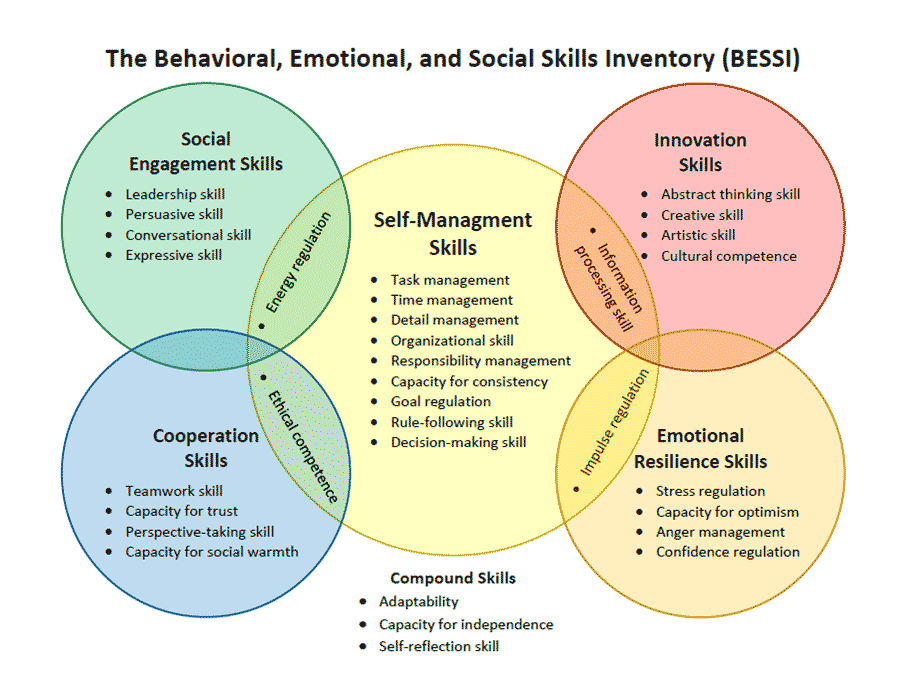Can you think of a time when you stepped out of your comfort zone? A time when you had to rise to the occasion to perform well in an interview, plan an event, keep your cool in a stressful situation, or come up with a creative way to solve a problem? These are times when you have used social, emotional, and behavioral skills. These skills help us maintain relationships with others, regulate emotions, and work towards goals. Importantly, these skills also help us get out of our comfort zone. They can be best understood in terms of what we can do when needed, rather than what we usually do.
Imagine a teen who tends to be shy. They aren't someone who usually wants to be in the spotlight. However, after seeing a call for auditions for the high school production of their favorite musical, they decide to try out for a small role. They get the part, and through rehearsing for the show, begin to feel more comfortable expressing themselves. On opening night, the usually shy and reserved student is self-assured and sociable. They've challenged themselves and risen to the occasion, making it easier to behave similarly the next time.
You can probably list out many other social, emotional, and behavioral skills. Some of these might be trivial, like how quickly you can make a peanut butter sandwich. Others would be more important, like how well you can set and pursue long-term goals.
But Which Skills Are Most Important?
Our research has identified five major categories of skills that might foster a happy, healthy, and successful life:
- Self-management skills, used to pursue goals and complete tasks
- Social engagement skills, used to actively communicate with other people
- Cooperation skills, used to make and keep positive social relationships
- Emotional resilience skills, used to regulate emotions and moods
- Innovation skills, used to learn from new ideas and experiences
Each of these categories includes many specific skills. For example, social engagement skills include things like how well you can talk with other people, express your thoughts and feelings, take charge of a group, and persuade people to agree with you. This chart shows the complete set of skills that we've identified so far.

We've also started investigating the best way to measure all these skills. For example, how can you know whether someone is highly skilled at coping with stress, or whether they struggle with this? We took a straightforward approach: we asked them. That is, we simply showed people a list of specific skills, and had them rate how well they can perform each one. Can they regulate their stress extremely well? Not at all well? Or somewhere in between?
This simple approach is surprisingly effective. In our research with the Behavioral, Emotional, and Social Skills Inventory (BESSI)—that's our free questionnaire for SEB skills, which you can take here—we've found that most people are willing to admit that they are better at some things than others. They don't just say that they're amazing at everything.
And what people say about their social, emotional, and behavioral skills matters. For example, we've found that students with strong self-management skills try harder in school and earn better grades—as confirmed by their teachers. Those who say that they have strong social engagement skills are more popular with their peers, and more interested in business-focused careers. Those with strong cooperation skills have more satisfying friendships, and are interested in jobs like teaching, counseling, and nursing that involve helping others. Those with strong emotional resilience skills tend to be happier, and are less vulnerable to anxiety and depression. Finally, those with strong innovation skills want to pursue careers in the arts and sciences, and are often involved with civic organizations and movements for social change.
This research highlights the overall importance of social, emotional, and behavioral skills. It also raises the possibility that people might be able to intentionally develop their skills. When we want to learn a new skill, like how to play a musical instrument, we usually find someone who can teach us. Then, we spend time (often lots of time!) practicing, and get regular feedback about our progress. This same cycle of instruction, practice, and feedback could also be used to improve social, emotional, and behavioral skills—or even learn new ones. If someone is willing to put time and effort into practicing their conversational skills, or their organizational skills, then they'll probably improve over time. If so, then helping people develop their skills could be an important pathway for promoting happiness and success in life.
For Further Reading
Soto, C. J., Napolitano, C. M., & Roberts, B. W. (2021). Taking skills seriously: Toward an integrative model and agenda for social, emotional, and behavioral skills. Current Directions in Psychological Science, 30(1), 26-33. https://doi.org/10.1177/0963721420978613
Soto, C. J., Napolitano, C. M., Sewell, M. N., Yoon, H. J., & Roberts, B. W. (2022). An integrative framework for conceptualizing and assessing social, emotional, and behavioral skills: The BESSI. Journal of Personality and Social Psychology, 123(1), 192-222. https://doi.org/10.1037/pspp0000401
Soto, C. J., Napolitano, C. M., Sewell, M. N., Yoon, H. J., & Roberts, B. W. (2022). Going beyond traits: Social, emotional, and behavioral skills matter for adolescents' success. Social Psychological and Personality Science. https://doi.org/10.1177/19485506221127483
Christopher Soto is Professor and Chair of Psychology at Colby College, and director of the Colby Personality Lab. He studies the structure, assessment, development, and outcomes of skills and personality traits.
Madison Sewell is a doctoral student in Educational Psychology at the University of Illinois at Urbana-Champaign. She studies the relationship between skills and civic engagement in youth.
Christopher Napolitano is an Associate Professor of Educational Psychology at the University of Illinois at Urbana-Champaign. He studies how people create their development.




